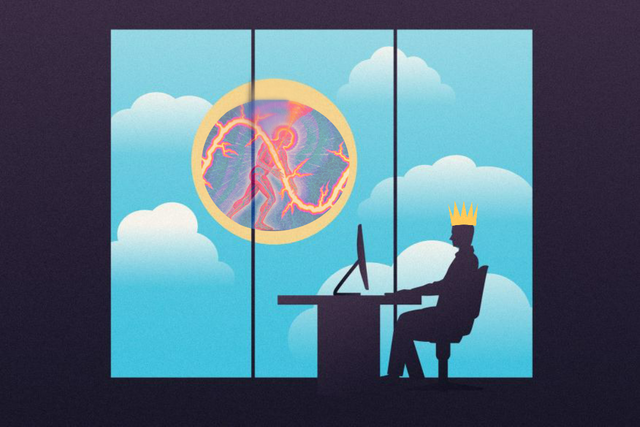
The first interesting question would be: Would we ever develop a circadian cycle? (In case you’re wondering, that’s the 24-hour internal body clock that controls our wakefulness and sleep.
I Think the first problem will be illness due to vitamin d defiency so you make look like a yellow plant:

I don’t know how you would achieve that. A planet that rotates about its axis will always experience a daily cycle of dark and light. Even a tidally locked planet wouldn’t be completely dark - there would be one side in perpetual sunlight, and the other in perpetual darkness, with a thin band of twilight in the middle.
But okay, assuming it’s possible…
This internal clock is calibrated by the light-dark cycles we experience; studies have shown that in the complete absence of light-dark cycles the body’s natural clock runs at about 26 hours per cycle. It’s entirely possible that without the constant day and night cycles, we would never have developed this internal clock in the first place, because there would have been no stimuli driving it. There would have been nothing to set the clock, so to speak.
And yet there are various other biological clocks that don’t require a day/night cycle. Some crabs have a body clock attuned to the phases of the moon, allowing them to reproduce and disperse their eggs only on nights of the full moon, when tides are highest. We’d still have seasons, so seasonal clocks like the ones that control hibernation would still exist. And in the more extreme cases, cicadas have a body clock tuned to 13 whole YEARS - they spend the vast majority of their lives as juveniles, and then, every 13 years, all of them mature at once, mate, breed, and die in a matter of weeks, presumably to avoid predators.
So it’s an interesting question! Assuming that we still needed sleep, our body might have evolved its own internal clock, not dependent on day/night cycles, that would control daily functions.
An alternate possibility is that, like dolphins and some birds, we would have evolved the ability to sleep with half our brain at a time. While one half rests, the other works, and then they switch every so often. There are no definite answers here - nobody knows for sure which one nature would have chosen.
The second interesting question is… Would we have better or weaker eyesight?
It seems intuitive that our eyesight would be weaker, because less light means eyesight isn’t as useful a trait. Several cave-dwelling animals have in fact evolved to be blind because there is no light in dark caves. We might instead develop better hearing, smell, etc. to compensate. Or even - possibly - infrared vision like snakes! (Would be really awesome.)
And yet it’s possible we would evolve in the other direction - developing stronger eyesight to compensate for the lower light levels. Several nocturnal animals do this, notably cats - which have a mirror-like layer of cells behind their retinas that lets them collect twice the amount of light and see much better in the dark. If we went this way, we’d have many more rod cells, receptor cells that provide night vision, as opposed to cone cells, which are good at distinguishing colour but bad in low light levels. We’d possibly also have larger irises to allow more light to enter the eye.
But the question I find most interesting is… Would humans even have evolved?
Early hominids that lived on the African savannahs evolved good vision and an upright posture in order to allow them to see further, to avoid predatory mammals like the cheetah. This adaptation also had the benefit of reducing the skin area exposed to sunlight, helping them stay cool in to hot, sunny environments.
In your hypothetical world, both these advantages are negated or significantly diminished - thus making me wonder if we could ever have evolved such an upright posture in the first place. It would depend a lot on how dark you intended the world to be, but I think there’s quite a significant possibility that hominids never evolve an upright posture.
This causes them to remain tree-dwelling apes and never spread out of Africa. And so humans never evolve.
no light no life
Downvoting a post can decrease pending rewards and make it less visible. Common reasons:
Submit
If there are no humans is there light?
Downvoting a post can decrease pending rewards and make it less visible. Common reasons:
Submit